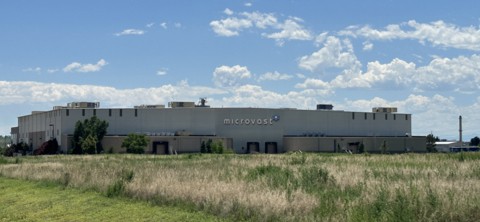Windsor chosen by Microvast for its second U.S. factory. Unlike its plans in Kentucky, this one is getting no pushback from members of Congress.
by Allen Best
Texas-based Microvast Holdings has announced plans for a lithium-ion battery factory at a building in Windsor with nearly 100,000 square feet of production space. The company describes the location as having ample room to add production lines for its energy storage systems as needed.
The company did not describe the manufacturing capacity or employment numbers but did say it expects the company to be in operation later in 2023.
Microvast opened a Technology and Testing Center in nearby Timnath during December 2022.
Founded in 2006 by Yang Wu, a naturalized American, the company specializes in high-performance utility-scale batteries and batteries for commercial transportation. In December, it announced it had won a contract for a 1.2 gigawatt-hour battery energy storage project located with a solar facility somewhere in the United States. The announcement did not identify the location or the project.
The company produces a 20-foot battery container that features what it calls an industry-leading 4.3-megawatt-hour energy density. It maintains functionality for more than 10,000 cycles. Higher density translates to fewer containers, a smaller footprint, and easier installation, plus reduced maintenance, the company says. In an October 2022 post, the website Solar Industry further explained that the container is designed for energy shifting applications such as renewables integration, peak demand, and capacity support.
Why Windsor? Because of what the company described as its “strategic location,” which it said will allow it to optimize its supply chain and reduce lead times. “This improved logistical capability is expected to strengthen our competitiveness and help us transport our product efficiently,” said Zach Ward, president of the Microvast Energy Division, in a press release.
Company representatives did not respond to requests for employment numbers or clarification of why Windsor’s location matters.
The new factory is part of a growing ecosystem of energy in the northern Colorado triangle of Greeley, Loveland, and Fort Collins.
Windsor is roughly 30 minutes from all three. In 2008 it became home to a Vestas factory that manufactures blades for wind turbines. That factory occupies 660,000 square feet of space. In nearby Loveland, Lightning eMotors manufactures electric fleet vehicles.
Audrey Herbison, director of economic development for the Greeley-based Upstate Colorado, described the battery factory as a tangible manifestation of federal legislation — both the Bipartisan Infrastructure Act of 2021 and then the Inflation Reduction Act of 2022 – designed to push the energy transition. This, she said, is the biggest project of which she is aware.
While Weld County remains well known and deservedly so as a base for oil and gas extraction, this indicates a diversifying economy. “In economic development, diversity is the name of the game,” she said.
A 2020 report by the organization found a 10% growth in payrolled business locations in the Weld-Larimer area over the previous five years and projected an 8% growth from 2020 to 2025.
See also: Two big new-energy factories along I-76. The takeaways?
Microvast’s battery manufacturing began in 2010 at a plant in China. Microvast went public in 2021 through a merger with a special-purpose acquisition company.
The company has factories in Tennessee as well as in Germany and China. It also had plans for a factory in Kentucky that were upended.
In May 2023, the company drew national attention. It was a candidate for a $200 million grant from the U.S. Department of Energy. Politico, in a May 23 report, said that Republicans had pointed to the company’s Chinese subsidiary as evidence that President Biden’s climate and clean-energy spending will benefit Beijing. The money for Microvast would have come from the 2021 Bipartisan Infrastructure Law.
“These funds are intended to strengthen America’s battery production and supply chain, not to tighten China’s stranglehold on these supplies,” said Rep. Frank Lucas, a Republican from Oklahoma who chairs the House Science Committee.
The Department of Energy, somewhat confusingly, said the company had been selected but had not been awarded a grant. U.S. Sen. John Barrasso, a Republican from Wyoming, said the Biden administration should “immediately eject other applicants with similar ties.”
On its website, Microvast posted a page of FAQs on June 21. It said it was “surprised” by the cancellation of the grant. “Despite the misleading rhetoric, Microvast is and will continue to be an American company deeply committed to doing business in the U.S. and creating American jobs, boosting the American economy, and securing battery manufacturing in the United States.”
The statement also said that Microvast has “no ownership or control by the Chinese government or the Chinese Communist Party.”
In a June 23 story focused on electric vehicles, Politico cited the cancelled grant and had this to say: “The new instinct for many lawmakers in Washington is to jump at even the appearance of Chinese influence — a choice that paradoxically could hinder the development of a U.S. battery supply chain, a chief goal of the landmark climate law that Congress passed last year.”
Why support Big Pivots?
You need and value solid climate change reporting, and also the energy & water transitions in Colorado. Because you know that strong research underlies solid journalism, and research times take.
Plus, you want to help small media, and Big Pivots is a 501(c)3 non-profit.
Big grants would be great, but they’re rare for small media. To survive, Big Pivots needs your support. Think about how big pivots occur. They start at the grassroots. That’s why you should support Big Pivots. Because Big Pivots has influence in Colorado, and Colorado matters in the national conversation.
- Mystery of the Disappearing Snowpack - May 14, 2024
- Polis has kind words, but is that enough for Tri-State? - May 9, 2024
- Audubon getting into West’s transmission - April 30, 2024






First and foremost. See: Weld County commissioners voted to ensure the county’s investments do not consider environmental, social and governance factors.
Also Windsor is known to ‘give the town away (meaning incentives in the way of ‘wavers’ and ‘tax breaks’). Just to name a few inducements.
Just as importantly!
As we consider batteries for the richest country in the world and billionaires; let’s keep in mind how the raw materials are ‘collected’
see: Story Jul 13, 2023“Cobalt Red”: Smartphones & Electric Cars Rely on Toxic Mineral Mined in Congo by Children.
*How proud are US?*